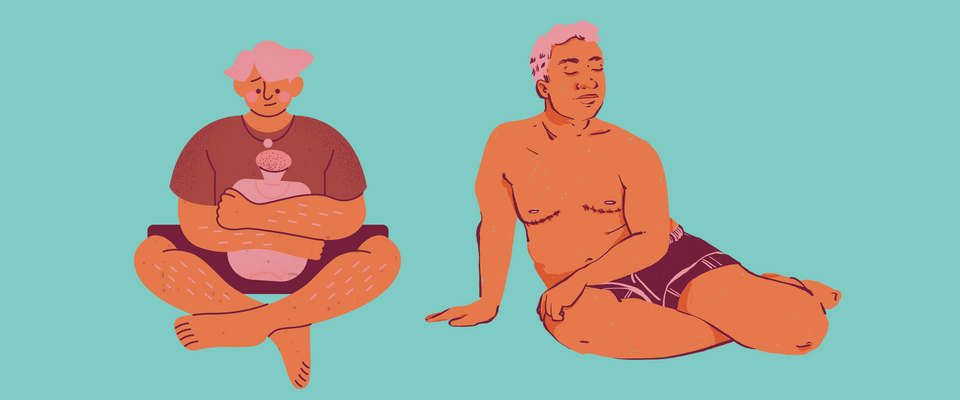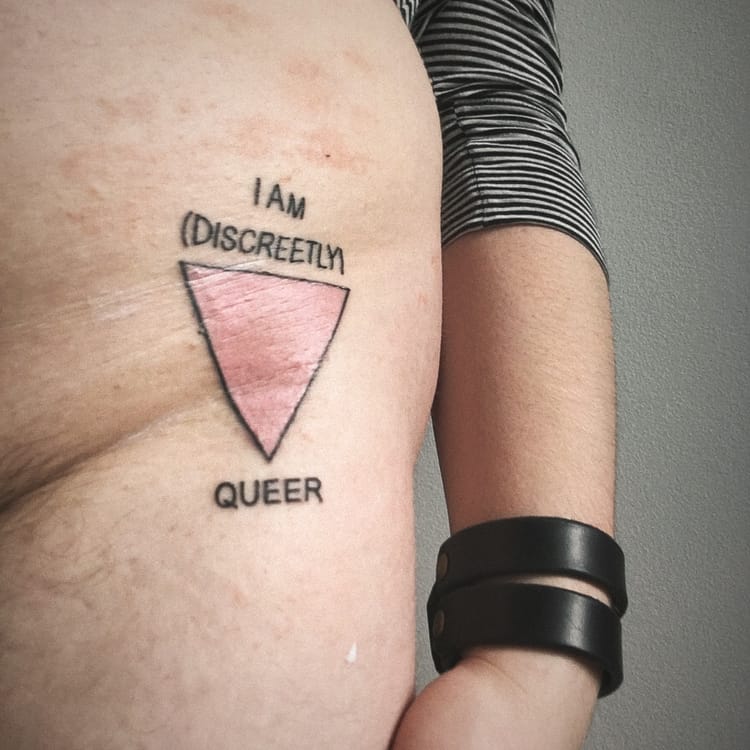Sometimes I forget that my chest isn't flat

[CW: suicide, self-harm, mental illness, gender dysphoria, discussion of 'passing']
Even though it's September, it’s too hot to bind today.
I’ve worn my binder much less this summer than I did last year. It's not that I'm any less dysphoric about my chest. I hate it. I often look down at my body and am disgusted by my tits. I'm viscerally revolted by that part of my own body. My tits feel so alien to me, they feel wrong.
My chest is bigger now than it was four years ago. For a long time, I thought this was because I was more aware of it due to dysphoria, as it's common for trans people to feel more dysphoric about their bodies after stepping into their gender. Having the language of dysphoria lets you identify something you may have dismissed because you couldn't make sense of it previously, so dysphoria can feel more intense. So I just assumed that my tits felt bigger because I was thinking about them more.
Then last year, when I was fighting to get a bridging prescription for testosterone, I was told I needed to come off the antipsychotic I'd been on for the last twelve months, as it might be impacting how I felt about my body. This was when I learned that a side-effect of the antipsychotic was literally making your chest bigger – something I hadn't been told, even though I was prescribed the medication by my doctor and community psychiatric nurse, who both knew I was trans and that I had dysphoria about my chest.
I'm more angry about this than I can coherently articulate. While there are times in the past where I have just wanted something, anything, that would make me less suicidal, I would have asked to be prescribed a different antipsychotic if I'd been told that this was a potential side effect. My dysphoria has a massive impact on my mental illness, and I can't believe I spent a over a year taking a medication that made my tits bigger and my dysphoria worse.
My dysphoria about my chest can be overwhelming, but at the same time I have never been more comfortable with my own body. I love my shoulders and the hair on my belly and my thighs. I love my dick and I love how my arse looks in a jock strap. I love my shaved head and my sideburns. After fifteen months on testosterone, I feel more confident and attractive but also more present in my own body.
And sometimes I even forget that my chest isn't flat.
The other day I was wearing my he/him/hole tank top around my flat, and I was feeling sexy and fuck-boy-esque. I felt good. But when I caught sight of myself in the mirror, I did a double take. The discordance between how I felt my body looked and how it actually looked felt like someone had punched me in the stomach. I didn’t understand how to make sense of what I was seeing there.
In my head, the shirt had fallen smoothly down my flat chest. In reality, it hadn’t been designed for a person with tits, and you could tell. The fabric fell weirdly, and it felt like it emphasised how big and wrong my tits were. The version of me in my head, with my flat chest and top surgery scars (the edges of which were just visible due to the cut of the tank top) had felt so real until I’d looked in the mirror. And now I just felt wrong.
I tore off the shirt. It didn’t matter how soft it felt against my skin or how masc it made me feel, I couldn’t get over the horrific reality of how I would look to other people. The gut-punch of dysphoria sent ripples of disgust through me. I was grossed out by my own body.
But even if I forget that my chest isn't flat, but the rest of the world doesn't.
Today I’m wearing high-waisted denim shorts, with the deep-orange tank top I bought years ago for my first time going to gay bar tucked into it. I’m not packing, and my nipples are probably (ok, definitely) visible through the thin fabric of my top. To most people, I probably look like a woman. Most people probably won’t notice, let alone read or respect, the pronoun pin I’m wearing.
Since my autism diagnosis, I’ve been trying to learn how to actually pay attention to my body. Realising just how bad I am at understanding not only what hunger/horniness/exhaustion feels like but even recognising that I’m feeling anything has pushed me to work on not disassociating. I now understand my physical and sensory needs so much better, even if they don’t make sense to other people.
While idea that people are perceiving me as a woman still makes me want to tear off my skin, I’m now much more comfortable not only in my body but in who I am. A year ago, don’t think I could have worn this outfit without thinking about how other people would be misgendering me. Today, I didn’t even consider grabbing my binder. The discomfort of binding, especially in this heat, doesn’t outweigh the slight alleviation of my dysphoria.
It's strange to have reached a point where I prioritise my own needs and comfort. It feels powerful – in a society where most cis people assume that if you have a vulva and tits, you must be a woman – to have truly internalised that my body is male.
The narrative that trans people are “born in the wrong body” doesn’t work for me. My body is already a man’s body because I am a man. My chest doesn’t make me less of a man. The assumptions people will make about my gender when they see my tits don’t make me less of a man. It’s not that I don’t care about being seen as a man, it’s that if you can’t see me as a man even when I’m not binding, that’s really not my problem.
I’ve known I wanted top surgery since before I started using he/him pronouns. I don’t want top surgery because men don’t have tits: lots of men, both cis and trans, have tits. I want top surgery because I want – I deserve – to have a body that doesn't make me feel wrong. Because when I close my eyes and picture myself, my chest is flat. When I think about my older self, he has top surgery scars. The idea of my chest being flat feels right.
So right that I sometimes forget that it isn’t.
Do you want essays exploring gender and transmasculinity delivered directly to your inbox on an irregular basis? Subscribe to Genderbent to support my writing and make sure you don't miss a newsletter.
Subscribe🍆 Cruising the internet
- It's somehow SEPTEMBER, but back in June I wrote about how 'love is love' tries to sanitise queerness for straight people for Mashable. In researching this piece, I found out that the cops who raided the Stonewall Inn on 28 June 1968 – leading to the Stonewall Uprising – were checking whether people wore at least three pieces of clothing that were "appropriate" for their gender, as per New York's laws at the time. I couldn't believe I hadn't heard that before – it feels like such an important piece of context in the face of the current onslaught of transphobic legislation we're facing.
- Also for Mashable, I wrote about how we don't need products to change how our vaginas smell. This one was inspired Carrie Bradshaw refusing to read an ad for vaginal odour suppositories in season two of And Just Like That – not because she knows such products are useless and companies profit off our insecurities, but because she's uncomfortable with her own vagina. "Because if we aren’t ashamed of our bodies, or uncomfortable with the type or amount of sex we’re having, how can we be sold a product that promises to fix us?"
- Talking about And Just Like That, I really enjoyed Tiffany Philippou's newsletter about why men like Aidan don't own Nespresso machines.
- Niko Stratis' piece on the relentless transphobia news cycle and how trans people are "always the topic, rarely the voice" is powerful and heartbreaking and you absolutely need to read it. "When will we stop putting transphobic news in the Pride section of a publication? There is nothing prideful here, it is just a shameful and hard reminder that there are many who see only as far as the value in clicks on the idea of a trans life—but there are few who see the same in the reality of our lives and our desires to see them improved."
- I have a lot of feelings about (straight, cis) people's reactions to season two of Heartstopper* and Eli Cugini captured several of them in his Dazed piece exploring who gets to write about gay men. While I think there is room for media depictions of queer teenagers who don't have sex (especially as someone who had my first kiss at nineteen!), I completely agree with them that "consuming stories about hyper-palatable, cute boys in love doesn’t mean that you’ve done the work to unpick more deep-seated homophobia." I'm also glad that he pointed out that Alice Oseman isn't a straight women but asexual and non-binary, a fact I think gets lost in many of the conversations about the Netflix show. "People do not ever seem to love us, not even our own people, as much as they do the lovable boys. Watching so many people enjoy Heartstopper is inextricable from that grief."
- In a recent newsletter, I shared Atlas Easton's incredible art based on the iconic photo of David Wojnarowicz wearing a jacket reading 'If I die of AIDS – forget burial – just dump my body on the steps of the FDA' in 1988. They actually made a version of their jacket for Brighton Trans Pride, and it's absolutely incredible. (You can buy Atlas' artwork here or here, or donate to their top surgery fundraiser.)
*I haven't watched it yet, because while I'm sure Charlie's mental illness is handled sensitively and offers much needed representation of men dealing with eating disorders, I'm pretty sure it's going to be very triggering for me personally.

